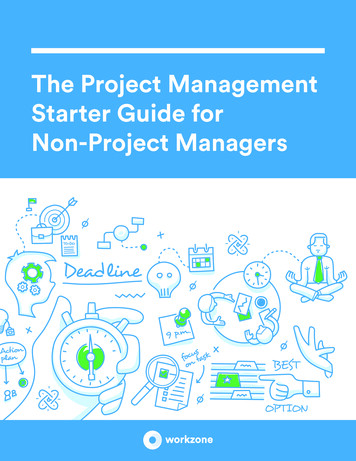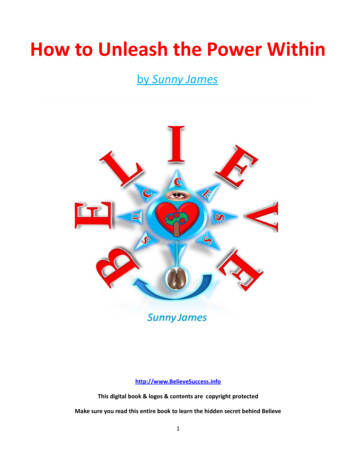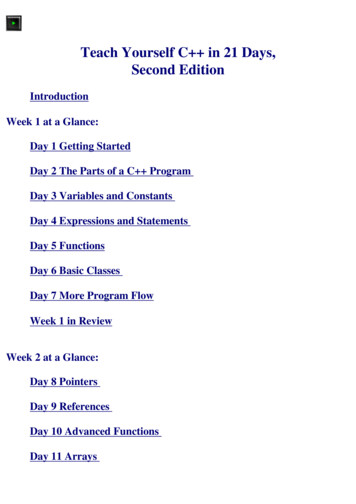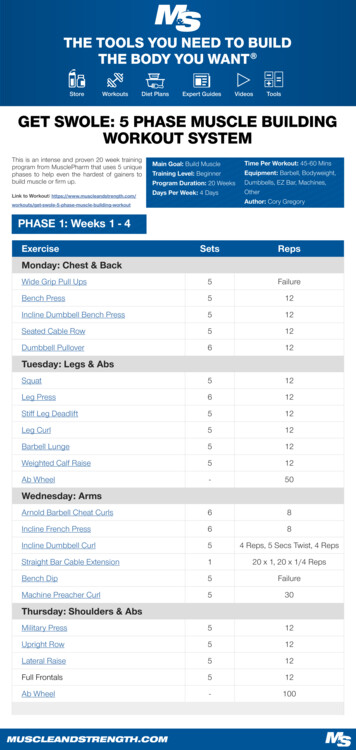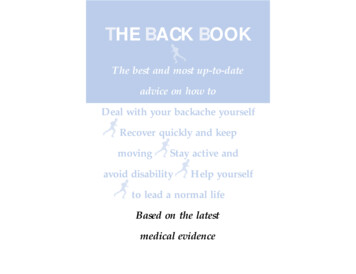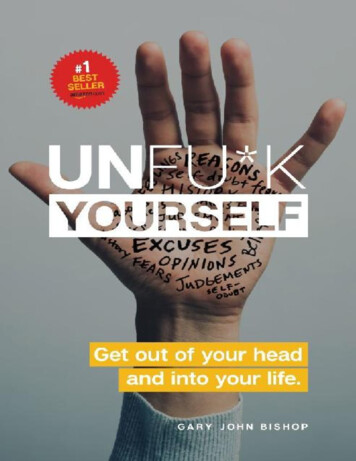
Transcription
Unfu*k Yourself
Unfu*k YourselfGet out of your headand into your life.GARY JOHN BISHOP
This book is dedicated to my three sisters; Paula, Elizabeth and Sandra, mymother Agnes and father, Patrick. We grew together, we cried together, westood together and we fought together. I am who I am because of you.I acknowledge the downbeat and trodden, the single mothers and unemployedfathers, the dreamers and wannabes; I am you, and you can do it.
Table of Contents01In the beginning 02“I am willing.”03“I am wired to win.”04“I got this.”05“I embrace the uncertainty.”06“I am not my thoughts; I am what I do.”07“I am relentless.”08“I expect nothing and accepteverything.”09Where next?
Chapter 1In the beginning
“This is a conversational slap fromthe universe to wake you up to yourtrue potential, to unfuck yourself andget spectacularly into your life.”
Have you ever felt like a hamster on awheel, furiously churning your waythrough life but somehow goingnowhere?All the while you’re caught in a loop of constant internal chatter andjudgement that never stops, a little voice telling you that you’re lazy or stupidor not good enough. You won’t even notice the degree to which you believeit or are drained by it, you’ll just be spending your day working to overcomethe stresses and strains, trying to live your life and at various points facing theresignation that if you can’t get your ass off this damned wheel maybe youare never going to get to where you want in life – maybe that happinessyou’re after or that weight you want to lose or that career or relationship youcrave will remain just out of reach.These pages are dedicated to those that experience that self-defeatingmonolog. The endless stream of doubt and subterfuge that limits and taintseveryday life. This is a conversational slap from the universe to wake you upto your true potential, to unfuck yourself and get spectacularly into your life.Let’s get this thing started in the right place. There are two kinds of talk youengage in every day: talking to others and talking to yourself. You might beone of those that insists, “I don’t talk to myself!” But, in fact, most of theconversations you have on any given day are with yourself—all “enjoyed” inthe solitude and privacy of your own head.Whether you’re introverted or extroverted, creative or practical, you spendhuge swathes of your time talking to YOU! You do it while exercising,working, eating, reading, writing, walking, texting, crying, arguing,negotiating, planning, praying, meditating, having sex, (on your own and
with others)—you name it. And yes, you even do it in your sleep.You’re actually doing it right now.Don’t worry, it doesn’t mean you’re crazy. Or, perhaps it means we’re all alittle crazy. Either way, we all do it, so settle in and welcome to the freakshow.Studies show that we have over fifty thousand thoughts per day. Think of allthe things you say to yourself that you’d rather not or that you try toovercome or defeat. While we have little or no say in those automatic andreactionary thoughts, we have a massive say in which of those same thoughtswe attach significance to. They don’t come pre-loaded!!The latest in neuroscience and psychology adds weight to the idea that thekind of talk you engage in has a profound impact on the quality of your life.Professor Will Hart of the University of Alabama conducted fourexperiments in which participants either recalled or experienced a positive,negative or neutral event. They found that people who described the neutralevent in ways that it suggested it was ongoing, actually felt more positive andwhen they described a negative event in the same way, they experiencedmore negativity. In simple terms, the language you use to describe yourcircumstances determines how you see, experience and participate in themand dramatically affect how you deal with your life and confront problemsboth big and small.The connection between what we say and how we feel has been known forhundreds if not thousands of years. Philosophers like Wittgenstein, Heideggerand Gadamer all knew of the importance and significance of language in ourlives. Wittgenstein said, “ the harmony between thought and reality can befound the grammar of the language”.The good news is, studies have continually found that positive self-talk candramatically improve mood, boost confidence, increase productivity, andmore. Much more. In fact, as evidenced by Professor Hart and his studies, itcan be one of the key components to a happy, successful life.The bad news is, the reverse is also true: Negative self-talk can not only putus in a bad mood, it can leave us feeling helpless. It can make small problems
seem bigger – and even create problems where none existed before. Here’sthe breaking news, your self-talk is fucking you over and in ways you can’teven begin to imagine.With all of this in mind, let’s get one thing clear: Even though this is a bookabout using the right language to improve your life, I’m NOT suggesting yousuddenly take on positive thinking or personal affirmations. Those subjectshave been done to death with varying degrees of success and certainly notwhat we’ll be doing here.I won’t ask you to tell yourself you’re a tiger as a way to unleash your inneranimal. Firstly, you’re not a tiger and secondly, well, you’re not a tiger. Thisall may work for some people, but I’m much too Scottish for that. To me,being told to do these sorts of things feels like being force fed a bucket ofmaple syrup liberally sprinkled with bits of last year’s candy canes. Thanksbut eh, no thanks.For all my “positives” out there, sorry but we’re taking this baby in anotherdirection! This book is designed to give you an authentic leg-up–one thatfeels genuine and right for you and can propel you into greater levels of yourtrue potential.THE DIFFERENCE BETWEEN SUCCESSAND FAILURE“If human emotions largely result from thinking,then one may appreciably control one’s feelings bycontrolling one’s thoughts – or by changing theinternalized sentences, or self-talk, with which onelargely created the feeling in the first place.”That quote comes from Albert Ellis, one of the forefathers of modernpsychology. Ellis found that how we think and talk about our experiencesshifts the way we feel about them. In short, our thoughts are bedfellows withour emotions.
Ellis also found that the way we think can often be completely irrational.Consider how many times you’ve told yourself something like, “I’m sostupid,” “I always mess things up,” “My life is over,” or some negativedescription of an event like, “this is the worst thing that’s ever happened tome”.Raise your hand if you’ve ever completely over-reacted to something that, inhindsight, barely registered on the important-o-meter? Ok, put your handdown, people are watching and you’re starting to look a bit silly. If you lookback you’ll see that in the instant before that seemingly random overreaction, you had a flash of outrageous self-talk, BANG! and off you gowith your good self.Some of the things we say and do aren’t always particularly rational but weseem to say and do them anyway! In addition, we never really see what weare leaving ourselves with or the emotional residue of engaging in even themildest of negative self-talk.You see, it’s not always dramatic self-talk, sometimes it’s subtle but equallydisempowering. If you’re working on something, you might think, “This isso hard. What if I don’t finish in time?” or worry about all the differentways you can “mess up,” which leaves you in an anxious or worried state.Sometimes negative self-talk leads to anger, sadness, or frustration thatmanifests in different or seemingly unrelated situations.This kind of self-talk doesn’t make your life any easier. The more you tellyourself how hard something is, the harder it will actually seem.Unfortunately, since we are constantly listening to a steady stream of ourautomatic inner thoughts and have become so accustomed to the critical voicein our heads, we often don’t realize how negative thoughts impact our moodand behavior in any given moment and, as a result, we end up doing—or notdoing—things our rational minds want us to do.For a simple example, take a moment to think about the daily chores youdread the most, all because you’ve built them up in your mind to besomething worse than they really are. We sometimes avoid simple things likefolding laundry and unloading the dishwasher, when they actually take littletime and effort. With enough of these little persistent items hanging around
it’s easy to collapse them in with the bigger, more important things until wefind ourselves overwhelmed or exhausted by life.Why do we “resist” certain things in our lives? We have a personalconversation about those kinds of tasks that is firmly rooted in some negativeopinion. Look in your own life for your “stuck-ness” and you’ll see what Imean. You have a pretty serious self-talk blockage!HOW LANGUAGE CHANGES OUR LIVESThe way we talk doesn’t only affect us in the moment. It can seep into oursubconscious and become internalized, changing our thoughts and behaviorin the long-term.In real everyday terms, the way we talk to ourselves and others instantlyshapes how we perceive life, and that same perception directly impacts ourbehavior right there in the moment. Ignore your perceptions at your peril!Even worse, live with the illusion that you don’t have perceptions!If you’re sometimes talking about how “unfair” life is, you’ll start to actaccording to that view, perceiving slights where none exist or, as studies haveshown, putting less effort into your work because you’ve already determinedit won’t accomplish anything. The unfair view will quickly become yourreality.On the other hand, the person who views success as if it were just around thecorner will not only work his butt off to achieve it but be energized and aliveto it and all the while acting on that fundamental view of success. To be clear,believing you will be successful is only one, (albeit important), part ofsuccess. By the same token, there is a way to accomplish great things withoutthat belief although the ride will be a bit rougher!If you’re worried that you don’t have that kind of personal belief, READ ON!Marcus Aurelius, the stoic philosopher turned Roman Emperor, said, “Here isa rule to remember in the future, when anything tempts you to feel bitter: not‘This is misfortune,’ but ‘To bear this worthily is good fortune.’”It’s entirely within our power to determine how we think about and talk about
our problems. They can be a nuisance or a stepping stone. They can hold usdown or lift us up.In fact, stoic philosophers like Aurelius believed that outside events hold nopower over us at all. We create our own reality with our minds.“Reject your sense of injury and the injury itselfdisappears.”Take some time here to ponder that statement.How willing are you to consider that your life is the way it is, not because ofthe weight of your circumstances or situation, but rather the weight of selftalk that pulls you down? That what you think you can and cannot do isinfluenced much more directly by some subconscious response than thereality of life itself?!If you keep looking out there, (outside of yourself), to your circumstancesand feverishly working to get out of them you’ll keep getting the sameresponse. No power, no joy, no vitality. At best it’s a see-saw of success anddisappointment, happiness and despair. Sometimes your circumstances justdon’t change, sometimes they stagnate and crystalize. What if that thingyou’re working toward, that thing you are sure will make you happier, betteror more confident doesn’t happen? What then? Even if it does arrivesomeday, what happens to your life between now and that day?This book will require you to seek the answer, not out there, but inside ofyourself. It’s not that you have to find the answer, you are the answer. AsI’ve said to my clients many, many times, people spend their lives waiting forthe cavalry, all the while never realizing they are the cavalry. Your life iswaiting on you to finally show up.RE-TRAIN YOUR BRAIN - ONE WORD AT ATIMEAll this talk about our subconscious isn’t just a bunch of psychobabble.
Scientists have discovered that our thoughts can actually change the physicalstructure of our brain. This phenomenon, neuroplasticity, is revolutionizingthe way we think about the human mind.As we go through life learning and experiencing new things, our brain isconstantly arranging and rearranging the neural pathways that control howwe think and behave. The best part is, we direct our thoughts in a way thatconsciously modifies these path ways for ourselves. And the easiest way toshape those thoughts is through conscious, decisive self-talk. The kind of talkthat “cuts through” and takes control of your life.Just like we build habits by repeating an action until it becomes “automatic”,we can use strong, assertive language over time to create lasting change inour lives. It’s more than just happy thoughts, (don’t break out the candy canesjust yet) – you’re affecting your brain’s very biology.We can determine our emotions by steering our thoughts. We can shape thosethoughts by being conscious of and diligent about our words and the kind oflanguage we engage in. A lot of this will come down to your basic toleranceof your current mindset and your willingness to change it.It all starts by making a conscious choice to talk in a way that’s helpful ratherthan harmful. By using the right kind of language and framing our problemsin a more readily accessible light, we can quite literally change the way wesee and interact with the world. All that stuff you’ve heard and read about,“creating your own reality”? It’s not only possible but millions of people theworld over are already doing it! And the best part is, they’re not only creatingit, they are in fact acting on it and living it.Remember, no matter how difficult, challenging, or pressing life’scircumstances can be, how you fundamentally relate to and engage with thosecircumstances will have the biggest say in how they turn out. Again, theanswer is inside you rather than outside you.How we talk, think about, and therefore perceive our surroundings is the veryfoundation for our reality. Create the reality you want to live in by beginningthe process of having the kind of conversations, (with yourself and others),that actually shape that reality. A simple way that I re-frame my owneveryday “problems” is by relating to them as opportunities. They instantly
become items in my life that I use to educate and expand myself. I becomecurious and engaged with them rather than my usual default annoyed andfrustrated self!ASSERTIVE VS NARRATIVEHow the heck does one create their own reality? By shifting your self-talkfrom being a streaming narrative (where you talk about yourself, others andlife, a dialog of opinion and judgement), to being assertive, where you castall of the default “noise” aside and assert your power right here and now.One of the first mistakes we make is when we talk about what we are goingto do or who we will be. Don’t even get me started on “should, or “try”! Subconsciously we are already determining when that will be happening and it’scertainly not in this moment of time.One of the reasons why we so often abandon New Year’s resolutions isbecause they usually use language to describe what we are “going” to do, i.e.later. All too often they begin with what we’re not going to do all of whichleaves us enthusiastic at the beginning but out of juice when faced with theinevitable moment when reality takes a swing at your face. You’ll bestanding there alone in the giant hole in your life left open by that behavioryou are apparently “stopping”. Those are the moments in life where yourinternal dialog runs riot! What if you’ve promised yourself to lose weight andare craving pizza or if you promised to save some money but that jacket youjust can’t live without is suddenly on sale? How does one deal with thosemoments when the enthusiasm wanes and those old thought patterns reemerge? What are you going to do instead?Assertive self-talk is when you stake a claim for this moment of time, righthere and now. When you start to talk in terms of “I am ” or “I embrace ”or “I accept ” or “I assert ”, all of which are powerful and commandinguses of language rather than the narrative of “I will ” or “I’m going to ”The physiological and psychological impact of using in-the-moment,assertive language is not only powerful, it has a very real in-the-momenteffect. There’s a massive difference between, “I am relentless” and, “I will be
relentless”. One of those statements intervenes in this moment of your life,the other lives more like a description of what’s to come rather than what’shere. All of this will require you to try out assertive speaking in your dailylife and catch yourself when you’re using the more general narrative kind ofspeaking.USING THIS BOOKIn this book you’ll find my hand-picked selection of personal assertions toempower, enliven, uplift and embolden you to take action in your day to daylife.You’ll also see quotes from famous historical figures, philosophers andsnippets of scientific findings, all of which are there to add weight to myapproach but not to prove it. While all of this is well and good, the only realway to read and interact with this book is to explore it for yourself and try onwhat I am saying. Take the time to think, ponder and experiment for yourself.There is no greater knowledge than the knowledge you have verified foryourself, in your own experience.If you take on the following pages as a personal experiment rather than anassessment of the content, you just may end up experiencing the most radical,life-changing exercise you have ever engaged with. Some of this willconfront, annoy, jar and exasperate you. Fine, get over yourself and read on.Like a good movie, it all comes together in the end!If you’re easily offended, stop reading now and re-gift this to someone inyour life that you think might benefit from it.I hope that this book will help you understand the complexity and power ofself-talk and how to use it as a force for good in your life. While we are notgoing to delve into the creative and destructive forces of language, you’ll geta sense of the ways in which your life experiences are formed and shaped inyour everyday thoughts and internal conversations.These pages will require you to think – to cognitively connect your languageand your feelings in a real and conscious way with your everyday life, to
explore the vast landscapes of life that present themselves when you begin tounderstand the magical connection between how you speak and how you feel.I recommend reading the book in it’s entirely with Post-it notes, a highlighteror any other method you can use to flag the parts that ring your particularbell. That being said, I have designed this book to be as accessible and usefulto as many people as possible. Each chapter, though part of the whole, standson its own, so you should dip in and out of it as much as you like. Use thisbook up, trawl through the words for what you need to make the difference inyour life until it’s pages are tired and weary from your appetite for change.In the day-to-day living of your life, you probably won’t need to keep pokingyour nose in here forever, (although you might, and that’s ok), so the realintention here is for you to use these ideas as a starting point whenever youare stuck or in need of rejuvenation.At those times, dive right in, drink from these pages and unleash the kind ofyou that the world has yet to see!Enjoy.
Chapter 2“I am willing.”
“Stop blaming luck. Stop blamingother people. Stop pointing to outsideinfluences or circumstances.”
You have the life you’re willing to put upwith.Think about it. What are the problems, those heinous, dark shadows currentlyspoiling the warmth and happiness of your otherwise blissful life?Do you hate your job? Are you in a bad relationship? Is there somethingwrong with your health? Fine, get a new job. End the relationship. Changeyour diet and exercise or locate the kind of help you need. Seems simpledoesn’t it? Even the things you seemingly had no say in, like the death of aloved one or losing your business, you have a MASSIVE say in the ways youlive your life in the aftermath of those events.If you’re not willing to take the actions to change your situation – in otherwords, if you’re willing to put up with your situation – then whether you likeit or not, that is the life you have chosen.Before you think “but.” or start to get your knickers in a twist let me sayone more thing: By defending your circumstances as they are right now, youare actually making a case for being where you are. Give it up.No buts. You can’t afford them. They’re excess baggage on a trip thatrequires you to travel light.“Circumstances don’t make the man; they onlyreveal him to himself.”- EpictetusAs Epictetus points to, the true measure of who you are won’t be found inyour circumstances but rather the way in which you respond to them. To startthis new process, you must first stop another one.Stop blaming luck.
Stop blaming other people.Stop pointing to outside influences or circumstances.Stop blaming your childhood or neighborhood.This approach is fundamental to everything that I talk about in these pages.You cannot, I repeat CANNOT dwell in any blame game in your life. Evenblaming yourself is completely useless. Of course you’ll face situations thatyou seemingly can’t control. You may even face tragic circumstances, likedisability, disease, or the death of a loved one.But there is always something you can do to impact those circumstances evenif you’ve had them for years and still can’t see a way. But first, you must bewilling. To fully embrace my approach, you must first accept that while thereare things have happened in your life that you had no say in, you are 100%responsible for what you do with your life in the aftermath of those events.Always, every time, no excuses.The dictionary describes willingness as – “The quality or state of beingprepared: Readiness”.In other words, willingness is a state in which we can engage with life andsee a situation from a new perspective. It starts with you and ends with you.No one can make you willing, and you cannot move forward until you reallyare willing to make the next move.When you are finally willing, you can literally experience that willingness,that innate freedom that courses through your veins and similarly when youare not, the kind of primordial stuck-ness that halts, and presses down on youlike some invisible weight on your chest.Believe me, I hear you, “I am willing but.”. Every time you add the “but” tothe end of that statement, you turn yourself into the victim. In my many yearsas a coach and mentor, I have heard as many complex life situations as thereare, from the darkest of pasts to the weight and gravity of the present orcrippling fear of the future, I have heard them over and over and over again.You have to hear what I am saying in the way that it’s intended. I’m notsaying these things to inflame you, well, maybe I am but the intention is toinflame you to your own potential, to realize your own greatness, not just to
piss you off! Take the case, imagine for a moment, that willingness is missingin your life. Not some wispy, sheepish willingness but rather a boldwillingness, the kind of willing state where you are ready for what’s next andready to act on it. Willingness to change, willingness to let go, willingness toaccept. Real, magical, inspired willingness.FINDING THE DOOR“Fate leads the willing and drags along thereluctant”- SenecaEither you control your destiny, or your destiny will control you. Life won’tstop for your pauses and procrastinations. It won’t stop for your confusion orfear. It will continue right along without you. Whether you play an active partor not, the show will go on.That’s why one of the first personal assertions I teach to my clients is: “I amwilling”.Before you can say that to yourself honestly, you must first ask yourself thequestion is, “Am I willing?” That question demands an answer. It can’t justbe left there in the nothingness of the universe. Am I willing? It pulls for aresponse. Am I willing? Its power is irresistible; I cannot escape its press fortruth.Am I willing to go to the gym?Am I willing to work on that project I’ve been putting off?Am I willing to face my social fears?Am I willing to ask for a raise or quit thisshitty job?In short, are you willing to stop living the life you have and start living thelife you’re after? It ALL begins with the emergence of willingness, thatliquid, constantly expanding and contracting state where life springs andcedes—and all of it is within you at the flick of a linguistic switch.
We often view ourselves as procrastinators or lazy or unmotivated. When inreality, we’re simply unwilling. We put things off or avoid them completelybecause we tell ourselves we just don’t want to do it or that we can’t do it.Instead of viewing this behavior as a character flaw, let’s create a sense ofwillingness where there is apparently none. A spark of potential, if you like.You are a master generator of this state of openness and potential. Once upona time in your life, this state was easy to access, enlivened by the vigor ofyouth or the curiosity of childhood. Somehow, over the years, we lost touchwith this magical state.The famous philosopher and political scientist Niccolo Machiavelli once said,“Where the willingness is great, the difficultiescannot be great”.Consider that for a second. It does not matter what you’re facing in life,which obstacle you’re trying to overcome – if you are willing to generate thatstate of willingness, that’s your doorway to making the effort, taking thesteps, dealing with the setbacks, and ultimately creating the progress andchange in your life that you’re seeking.That’s why such a simple statement – “I am willing” – is so profound. Youbecome enlivened and empowered by its promise, open to its allure.I ask again: are you willing?WHEN THE DOOR IS CLOSEDMaybe you are in fact, unwilling. In many cases, that may actually be thebest answer you can give.Sometimes declaring your unwillingness can be just as powerful as declaringwillingness.Are you willing to live with a body that’s unhealthy? No. Are you willing tocontinue living paycheck to paycheck? No. Are you willing to put up withunworkable, unsustainable relationships? No.
I AM UNWILLING!!Unwillingness ignites resolve and determination. It provides an access totaking a robust and urgent approach to your situation. When you areunwilling it often represents a line in the sand where you are no longerwilling to go back the way.Only when you’re unwilling to continue just simply existing, feelingunsatisfied and unfulfilled, will you make the effort necessary to make achange. Only when you’re unwilling to put up with the bullshit any longerwill you grab your shovel and start digging. At times there is no greatermotivation to change than the unwillingness to do “this” any longer. Whichone works for you in your life currently? I am willing or I am unwilling? Canyou see how being unwilling can potentially be just as powerful as beingwilling?Depending on the circumstance, some of us feel more empowered by theassertion, “I am willing,” while for others declaring “I am unwilling” givesthem strength and resolve. You might find yourself motivated by bothequally depending on the situation.Whichever category you fall into, you can not only shift the personalassertion, you can re-frame the way you approach your problems.For example, are you willing to find a new job? Yes. “I am willing.” Are youwilling to stay in a job you hate? No. “I am unwilling”.Both assertions can be just as effective. It’s up to you to determine which onefits your persona and situation. Which one “does it” for you?THE POWER OF PURPOSEThere’s another way for your unwillingness to free you from the hamsterwheel because sometimes it doesn’t matter what you ask yourself or howmany times you’ve said it; you just can’t muster the willingness long enoughto change anything. You might well be one of life’s great-starters-but-notfinishers. At the end of it all, you might have to face the cold reality that youhave been all too willing to remain the same. You have been unwilling to
fundamentally change your life and lose that weight for good, thatsomewhere in there you are ok with living this way. I mean, come on, youmust be or you would have changed it by now! At some level you must havesome tolerance to having your life turn out like this.That’s actually okay. Getting straight with yourself about having made thedecision to stay where you are can be just as powerful as the decision tomove. Why? Because sometimes recognizing that you willingly put yourselfin a place where you are unhappy is often all the impetus required to make anopening for real and lasting change. This has to be done without blamingyourself and turning yourself into a victim of some internal blip or character“flaw”. In the moment you realize you have cognitively and systematicallyput yourself here, guess what? That’s right, you can cognitively andsystematically get yourself out! This is also the foundation of grantingyourself the grace of acceptance, of embracing what has been and daringyourself to reach for an unimaginable future.“He is a wise man who does not grieve for thethings which he has not, but rejoices for those whichhe has”- EpictetusBy stating and facing your unwillingness to change, you can take stock ofyourself and your life and begin to create a sliver of light for you to at leaststart. The secret is, once you’ve separated the task (or whatever it is you aredealing with), from the drama of the past, you may fi
And yes, you even do it in your sleep. You’re actually doing it right now. Don’t worry, it doesn’t mean you’re crazy. Or, perhaps it means we’re all a little crazy. Either way, we all do it, so settle
